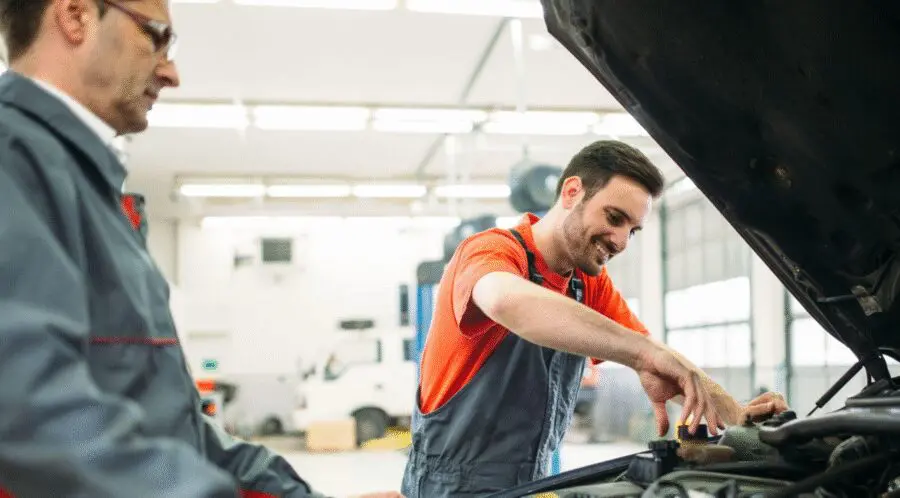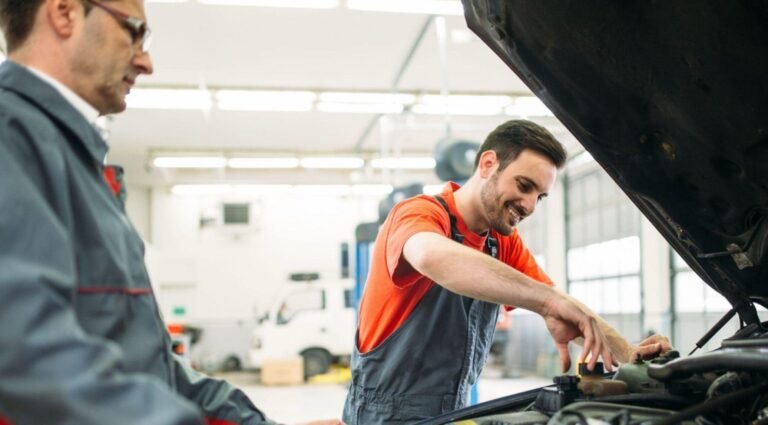
Owning a car brings convenience and independence, but it also requires consistent care and maintenance. In some situations, even a well-built vehicle can develop issues if minor issues are overlooked. Thus, understanding the most common car repairs and how to prevent them can help you reduce expenses, avoid sudden breakdowns and keep your vehicle in excellent condition.
In this aspect, this blog will discuss the top ten most common car problems faced by drivers, along with practical advice on how to avoid them.
Oil leaks are one of the most common issues faced by both new and old vehicle owners. They usually occur if gaskets or seals wear out or when the oil filter becomes loose. If the leak is unidentified, the engine will run with insufficient lubricant, which can cause damage to internal components to grind against each other and overheat. This occurrence can lead to severe damage that may need multiple repairs in your car.
Ways to avoid it: You should regularly inspect your car’s oil level and the ground under the vehicle for dark patches or stains. Subsequently, replace gaskets and oil filters during routine servicing and always use the oil grade recommended in your owner’s manual. Thus, following these steps can keep your car’s engine running smoothly for years.
2. Brake Pad and Rotor Replacement
Brake pads and rotors can wear down naturally due to friction. Over time, this wear can cause squealing noises, vibration during braking, or reduced stopping power. Driving with worn-out brake pads may damage the rotors and increase the urgency of repairing such components.
Ways to avoid it: To avoid such instances, schedule brake inspections every 10,000 kilometres. Replace pads before they become too thin, and try to avoid using strong chemicals and sudden braking. Gentle braking increases the lifespan of brake components and improves safety on the roads.
A car’s battery lifespan usually lasts three to five years, but usage in extreme temperatures can reduce its endurance. A weak or dead battery can leave you stranded, and this is more common during the winter season.
Ways to avoid it: Have your car’s battery tested once a year and before the beginning of the winter season. Subsequently, keep the terminals clean and free from corrosion. If you drive frequently, take your vehicle on a longer trip once a week to recharge the battery to its full load capacity to ensure optimal performance.
The alternator charges the battery and powers your car’s electrical system. If it begins to fail, you may notice dimming headlights, slow electric windows or warning lights on the dashboard.
Ways to avoid it: Look for signs such as flickering lights or difficulty starting the car. If you live in Ahmedabad, consult the best mechanics for car repair in Ahmedabad to check the alternator output during the routine servicing.
An overheating engine is one of the most severe mechanical failures. It may happen if the radiator, coolant hoses, or water pumps malfunction. Driving with a faulty cooling system can also warp the engine or blow the head gasket.
Ways to avoid it: Check the essential fluid levels monthly and top up using the correct mixture of coolant and water. Also, replace the coolant every two years and ensure the radiator cap is tightly sealed.
6. Suspension and Steering Wear
Suspension and steering systems directly affect how smoothly and safely your car handles. Worn shocks, struts or ball joints can lead to uneven tyre wear, poor stability and increased braking distance.
Ways to avoid it: You need to pay attention to how your car feels while driving. If it pulls to one side or feels bouncy, then it should be checked by a mechanic.
Some of the common transmission problems include slipping gears, delayed shifting, and fluid leaks. All of these can result from old or insufficient transmission fluid.
Ways to avoid it: Follow the manufacturer’s recommendation for transmission fluid replacement intervals. If you notice reddish fluid on the ground, it can indicate a leak that needs immediate attention. At the same time, avoid overloading or towing beyond your vehicle’s capacity.
A damaged or leaked exhaust system can affect the car’s performance and fuel efficiency. Corrosion, rust, or physical impact from road debris can also increase harmful gas emissions.
Ways to avoid it: inspect your car’s exhaust during each visit. If you live in locations with high humidity or near the coast, rinse the car’s underbody as it prevents rust.
9. Tyre replacement and Alignment
Tyres naturally wear down over time, but incorrect tyre pressure, misalignment or road debris can cause natural or premature wear.
Ways to avoid it: To avoid such instances, check the tyre pressure every month and keep it at the recommended level as per your car manufacturer’s user manual. After that, rotate your car’s tyres every 10,000 kilometres to ensure even wear.
Spark plugs ignite the fuel-air mixture inside the engine. However, worn or dirty spark plugs can lead to misfires, poor acceleration and increased fuel consumption.
Ways to avoid it: You can replace spark plugs according to your vehicle’s recommended interval. If you notice rough changes or decreased performance, place your plugs under inspection early to prevent further issues.
Most cars encounter mechanical issues at some point, but following some preventive measures and common repairs can help fix such issues. This outcome can be easily identified by listening to unusual sounds and warning lights, and scheduling professional inspections. Preventive practices such as fluid checks, tyre rotation, and timely part replacement are beneficial because they improve road safety while increasing fuel efficiency.
Please follow and like us:


